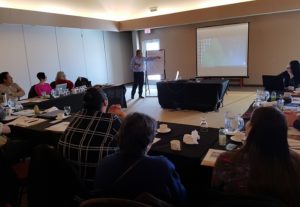Heritage and burial information sessions underway in hopes to help First Nations bring ancestors home

By Laurie Leclair
February and March will be busy months for Anishinabek Nation’s Heritage and Burials Committee and for its member First Nations.
Kevin Restoule, Government Relations Coordinator, and Jenny Restoule-Mallozzi, legal counsel, have put together a series of workshops aimed at developing a customizable template for Anishinabek First Nations to use as a guide when faced with heritage and archaeological issues. Regional meetings have occurred in Peterborough and Manitoulin Island, and others are planned for London and Thunder Bay.
This project originated in 2015 when the Anishinabek Nation published a Toolkit for Understanding Aboriginal Heritage and Burial Rights and Issues which was designed to help its citizens navigate existing federal and provincial legalese, offering user-friendly descriptions of the most relevant heritage and archeological acts and legislation. Soon after, Elders and Knowledge Keepers as well as cultural experts were interviewed and a narrative of their opinions, concerns, and actions over repatriation and ancestor-care was written as a companion piece to the tool kit.
The discussions that are generated will help refine Heritage and Burials procedures and eventually produce a guide that can be tailored to suit each First Nation. The knowledge gathered is cumulative so that each new session will benefit from what was shared in the previous sessions.
Although the day is designed to encourage the flow of conversation, there is a structure to the proceedings. Restoule outlines the project’s vision and how the protocols could be implemented to best accommodate the heritage and burial needs of a First Nation.
Following Restoule’s presentation Anishinabek Nation researcher Laurie Leclair offers a summary of the main topics of concern as they evolve from the 2015 interviews to the previous protocol meeting.
Finally, at each session, presentations highlighted First Nation knowledge and experience on related topics. For example, at the Peterborough meeting on January 10, speakers from Curve Lake First Nation provided a case study presentation on the development and implementation of heritage protocols. At the February 5 meeting in Little Current, Whitefish River First Nation discussed the repatriation of those ancestors and cultural treasures which were stolen in 1936 and stored at the University of Michigan’s Museum of Anthropology until they came home in 2005. And as always, there are prayers of Welcome and Thanksgiving.
Inevitably, there is a discussion of the Ontario Ministry of Tourism Culture and Sport’s draft technical bulletin Engaging Aboriginal Communities in Archaeology (2011). The work is an abridgement of the larger Standards and Guidelines for Consultant Archaeologists, which outlines policies and practices directly affecting all off-reserve archaeological sites. Most community heritage officers find many aspects of the bulletin offensive and disrespectful, especially in its approach to First Nation language, agency, appropriateness, and efficacy. They also see this attitude echoed in many parts of the archaeological, museological and academic worlds. You can read/download the bulletin here.
The challenge for First Nation policy makers will be to develop archaeological standards and practices that are beneficial to their First Nation in terms of education and entitlement without compromising traditional knowledge and beliefs, without doing harm to an ancestor’s dignity. Brandy George, a licensed archeologist and Anishinaabekwe, summed up how she is able to bridge the two worlds:
When I go to Universities and talk to classes, I talk about the Golden Rule, to treat others the way you want to be treated. Archeology is after all the study of people.
Respect for ancestors lies at the core of each discussion. Any protocol must have as its base a necessity to care for our grandparents, and careful practices must be put in place to treat their treasures in the most appropriate ways possible. Standards will be successful in the long-term if they can move beyond the physical care of artifacts into holistic policies that incorporate spirituality, language, agency, and decolonization.
Two more sessions are to be held: one in London on February 12, 2019 and one in Thunder Bay, date to be determined.


